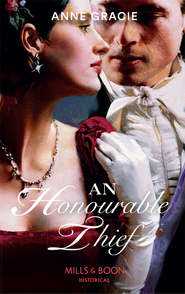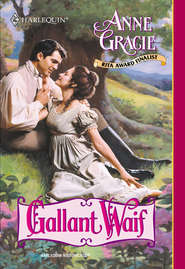По всем вопросам обращайтесь на: info@litportal.ru
(©) 2003-2025.
✖
Tallie's Knight
Автор
Год написания книги
2018
Настройки чтения
Размер шрифта
Высота строк
Поля
‘I beg your pardon?’ said Tallie, puzzled.
‘He’s courting. Lord d’Arenville. One of those young ladies must be his intended, and he wishes some time with her before he pops the question. He’ll probably announce it at the ball.’
‘Well, well, so that’s it. A courting couple in the old house once again.’ Brooks’s face creased in a sentimental smile.
‘Lord, Mr Brooks, you’re a born romantic if ever I saw one,’ said Mrs Wilmot. ‘I can no more see that Lord d’Arenville lost in love’s young dream than I can see me flying through the air on one of me own sponge cakes!’
Tallie stifled a giggle at the image conjured up. ‘And why is that, Mrs Wilmot?’ she asked.
‘Why?’ Mrs Wilmot turned to Tallie in surprise. ‘Oh, yes, you’ve never met him, have you, dearie? I keep forgetting, you’re related to the other side of madam’s family. Well, you’ve not missed out on much—a cold fish if ever I saw one, that Lord d’Arenville. They call him The Icicle, you know. Not a drop of warm blood in his body, if you ask me.’
‘But I thought all you females thought him so handsome,’ began Brooks. ‘He had you all in such a tizz—’
‘Handsome is as handsome does, I always say,’ said the housekeeper darkly. ‘And though he may be as handsome as a statue of one of them Greek gods, he’s about as warm and lively as a statue, too!’ She shook her head and pursed her lips disapprovingly.
Intrigued though she was, Tallie knew she should not encourage gossip about her cousin’s guests. And they had more than enough to do without wasting time in idle speculation. Or even idol speculation, she giggled silently, thinking of the Greek god.
‘Well, then,’ she said, ‘it is fortunate that we need not concern ourselves with Lord d’Arenville except to spend his money and present him with a reckoning. And if we need not worry about expense, the servants may be billeted in the village. I suppose we should begin to make a list of what needs to be done.’ She glanced at the clock on the mantel. ‘I am expected back in the nursery in half an hour, so we will need to hurry.’
Later that evening, as she walked slowly out of the nursery, leaving her three charges yawning sleepily in their beds, their loving goodnight kisses still damp on her cheeks, Tallie decided she would have to take herself more firmly under control. She could not go on in this fashion.
The degree of resentment she’d felt this morning had shocked her. And it was not Laetitia’s thoughtlessness Tallie resented, but the mere fact that she was coming home.
It was very wrong of her to feel like that; Tallie knew it. She ought to feel grateful to Laetitia for the many things she had done for her—giving her a home, letting her look after her children…And it was Laetitia’s home, Laetitia’s children. Laetitia was entitled to visit whenever she wished.
The problem lay with Tallie. As it always did. With her foolish pretences and silly, childish make-believe. It was getting out of hand, pretending, day after day, that these three adorable children were hers. And that their father, a dashing and romantic if somewhat hazy figure, was away on some splendid adventure, fighting pirates, perhaps, or exploring some mysterious new land. She had dreamed so often of how he would arrive home on his coal-black steed, bringing exotic gifts for her and the children. And when they had put the children to bed he would take her in his arms and kiss her tenderly and tell her she was his pretty one, his love, his little darling…
No. It had to stop. She was no one’s pretty one, no one’s darling. The children’s father was bluff, stodgy George, who drank too much and pinched Tallie’s bottom whenever she was forgetful enough to pass within reach. He never came near the children except at Christmas, when he would give them each a shilling or two and pat them on the head. And their mother was Laetitia, beautiful, selfish, charming Laetitia, ornament of the London ton.
Tallie Robinson was nothing—a distant cousin with not a penny to her name; a plain, ordinary girl with nothing to recommend her; a girl who ought to be grateful to be given a home in the country and three lovely children to look after.
There would never be a dashing knight or handsome prince, she told herself savagely. The best hope she had was that a kind gentleman farmer might want her. A widower, probably, with children who needed mothering and who would notice her in church. He would look at her plain brown hair and her plain brown eyes and her plain, sensible clothes and decide she would do. He would not mind that her nose was pointy, and marred by a dozen or so freckles—which no amount of lemon juice or buttermilk would shift. He would not care that one of her front teeth was slightly crooked, nor that she used to bite her nails to the quick.
Tallie looked down at her hands and smiled with pride at her smooth, elegant nails. That was one defect, at least, she had conquered since she left school. Her kindly gentleman farmer would be proud…Drat it—she was doing it again. Weaving fantasies with the slenderest of threads. Wasting time when there were a thousand and one things to be done to prepare for Cousin Laetitia’s house party. Tallie hurried downstairs.
The Russian Prince cracked his whip over the arched necks of his beautiful grey horses, urging them to even greater speed. The curricle swayed dangerously, but the Prince paid no heed—he was in pursuit of the vile kidnappers… No! Lord d’Arenville was not a prince, Tallie told herself sternly. She patted her hair into place and smoothed her hands down her skirts. He was real. And he was here to be with his intended bride. He was not to appear in any of her silly fantasies.
But Mrs Wilmot was right—he certainly was handsome. Tallie waited for her cousin to call her forward and introduce her to the guest of honour. He had arrived only minutes before, clad in a caped driving coat and curly brimmed beaver, sweeping up the drive in a smart curricle drawn by two exquisitely matched greys. Tallie knew nothing at all about horses, but even she could tell his equipage and the greys were something out of the ordinary.
She’d watched him alight, springing lightly down from the curricle, tossing the reins to his groom and stepping forward to inspect his sweating horses before turning to greet his hosts. And thus, his priorities, Tallie told herself ironically—horses before people. Definitely not a prince.
He was terribly handsome, though. Dark hair, thick and springy, short cropped against a well-shaped head. A cleanly chiselled face, hard in its austerity, a long, straight nose, and firm, unsmiling, finely moulded lips. His jaw was also long, squaring off at the chin in a blunt, uncompromising fashion. He was tall, with long, hard horseman’s legs and a spare frame. And once he’d removed his greatcoat she could see that the broad shoulders were not a result of padding, but of well-developed musculature. A sportsman, not a dandy…A pirate king… No! A haughty guest of her haughty cousin.
Tallie watched him greet Laetitia—a light bow, a raised brow and a mere touch of lips to hand. No more than politeness dictated. He was not one of her…cicisbeos, then. Tallie heaved a sigh of relief. It was not to be one of those house parties. Good. She hated it when her cousin used Tallie and the children to cover up what she called her ‘little flirtations’.
Laetitia turned to introduce him to those of the staff whose names he might need—the butler, the housekeeper and so on. Tallie watched him, noting the way his heavy-lidded grey eyes flickered indifferently over Brooks and Mrs Wilmot.
‘And this is a distant cousin of mine, Miss Thalia Robinson, who resides here and keeps an eye on things for me.’ Insignificant poor relation who hangs on my sleeve, depending on my charity, said her tone, dismissively.
Tallie smiled and curtsied. The cold grey eyes rested on her for a bare half-second and moved on. Tallie flinched, knowing that in a single glance Lord d’Arenville had noticed the freckles, the pointy nose and the crooked tooth, and despised her. He hadn’t even glanced at her nice nails. No gallant knight, he, but a cruel count, coldly plotting the heroine’s downfa— Enough!
Tallie watched his progression into the house with rueful disappointment. Mrs Wilmot was right. The man acted as if he expected the whole world to fall at his feet, while he would not so much as notice if it crumbled to dust right under his long, aristocratic nose! She wondered which of the young ladies was his intended. She had not taken to any of them, but she could not imagine anyone wishing to wed this arrogant Icicle.
‘Thalia!’ Her cousin sounded annoyed. Tallie hurried inside.
‘You called, Cousin Laetitia?’ She did not allow herself to look at Lord d’Arenville, although she was very aware of him standing close by.
‘I thought I made myself clear!’ Her cousin gestured crossly.
Tallie looked upwards and repressed a grin. Three small heads were poking through the railings in complete defiance of the orders which Laetitia had issued to the nursery. Children were neither to be seen nor heard during the house party.
‘I’ll see to it at once, Cousin.’
‘Your children, Tish?’ His voice was deep and resonant. In a warmer-natured man it could be very appealing, thought Tallie irrelevantly as she gathered her skirts to run up the stairs.
‘Do they not wish to come down?’ he added.
Tallie paused and looked at him in surprise. The Icicle was interested in her cousin’s children? No, for he seemed wholly engrossed in removing a speck of fluff from his sleeve.
‘No, they do not,’ said Laetitia quickly. ‘It is high time they went to bed, and it is one of Thalia’s little duties to see that they do so. Thalia! If you please!’
Tallie ran quickly up the stairs, biting her lip to prevent the retort she knew would escape if she stayed a moment longer. Time they were in bed, indeed! At five o’clock in the afternoon? And one of her little duties? Amongst the other hundred or so her cousin daily required of her in exchange for bed and board. She reached the second landing where two little girls and a boy were sitting. Watched by two pairs of eyes, she lifted up the toddler, took the other little girl by the hand and headed for the nursery, the small boy jumping and hopping on ahead.
‘Now, Magnus,’ said Laetitia, ‘Brooks will show you to your room, and you can prepare yourself to meet my other guests in the drawing room at about six. Brooks, have hot water sent to his lordship’s room immediately. And…brandy, Magnus? Or would you prefer a cup of tea?’
‘A refreshment tray has already been sent up, madam, with hot tea and coffee, sandwiches and brandy,’ said Brooks. ‘And the hot water is awaiting his lordship.’
‘Oh, er, good. Well-done, Brooks,’ said Laetitia.
‘Miss Tallie saw to it all, madam. She does the same for all the guests,’ said Brooks, hiding a smile. Just another of her little duties. He felt the cold gaze of Lord d’Arenville on him and his face pokered up into its usual butlerish impassivity.
‘If you would care to follow me, your lordship. Madam has put you in the Blue Room, as usual.’
‘Thalia, you must dine at table this evening. That wretch Jimmy Fairfax has brought two friends with him and we have a shortage of ladies. And did you tell Cook that we must have goose as well as the capons? I have no time to discuss the menu with her so you must check it. And see that the extra guests have beds made up for them. I am utterly exhausted and need to repose myself before dinner. Lord, I hope Magnus is grateful for the efforts I am making on his behalf. I shall be glad when it’s all over.’
Tallie mentally agreed. The last ten days had been exhausting and frustrating, and she was counting the hours until the guests departed. Still, she flattered herself that everything was going off quite smoothly.
This was, however, one order she felt unable to carry out. ’I have nothing to wear to dinner, Cousin.’
‘Lord, girl, as if anyone will care what you wear. No one will take any notice of you—you are just there to make up the numbers. Any old thing will do.’
‘I have only one evening dress, Cousin, the one you gave me several years ago, and as you must know it does not fit me.’
‘Then alter it, for heaven’s sake! Or wear a shawl or something over it. I cannot be expected to think of everything! Now leave me at once, for if I do not get some peace and quiet I fear I will have the headache by dinnertime.’
‘Yes, Cousin,’ Tallie murmured between her teeth. It went very much against the grain to submit so tamely to her cousin’s rudeness, but poverty had taught her to take a more pragmatic view. In the short term, it was unbearable to be treated in this fashion. On the other hand, Laetitia was rarely here, and for most of the year at Manningham there were just Tallie and the children and servants. In truth, she told herself severely, she had a delightful life. An orphan with not a penny to her name ought to be grateful to have a roof over her head. That she didn’t feel grateful was, no doubt, a deficiency of character.
Tallie hurried downstairs. She consulted with Cook about the menu, Mrs Wilmot about the arrangements for the unexpected guests and Brooks about the wines for dinner, then hurried back upstairs to see to her dress.








